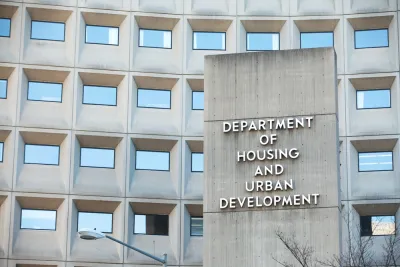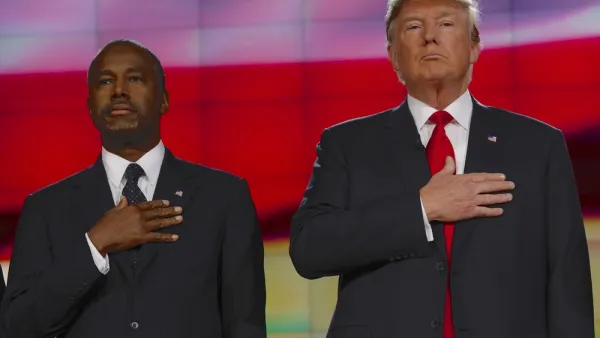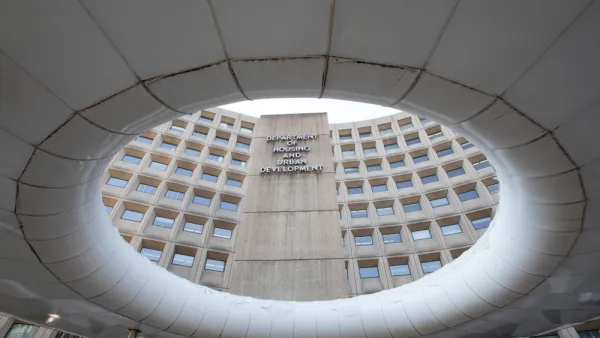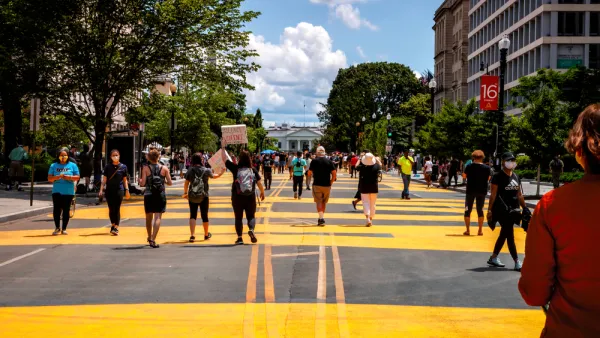The Trump administration didn't just dismantle an Obama-era fair housing rule—it replaced it with a new policy of its own called Preserving Community and Neighborhood Choice.

As documented repeatedly by Planetizen, the Trump administration recently dismantled the Affirmatively Furthering Fair Housing (AFFH) rule, a policy adopted by the Obama administration to provide more effective enforcement of the Fair Housing Act of 1968.
The policy that the Trump administration has chosen to replace the AFFH rule is called the Preserving Community and Neighborhood Choice (PCNH) rule, which the the National Council of State Housing Agencies (NCSHA), is on the record describing as a requirement for U.S. Department of Housing and Urban Development grantees to certify that the use HUD funds will actively promote fair housing.
A few additional articles published at the end of July offer additional insight for how the Trump administration intends to enforce fair housing laws, starting with an article by Matthew Choi for Politico, who includes this explanation of the new rule amidst an article that mostly focuses on the pro-segregationist stance now given full and vocal support by the president of the United States:
The Department of Housing and Urban Development announced a replacement policy last week that essentially leaves localities to self-certify that housing is affordable and free of discrimination — a significant scale-down of the Obama-era rule.
“After reviewing thousands of comments on the proposed changes to the [AFFH] regulation, we found it to be unworkable and ultimately a waste of time for localities to comply with, too often resulting in funds being steered away from communities that need them most,” HUD Secretary Ben Carson said last week.
Another article by Sean Keenan for the SaportaReport shares insight from experts in the Atlanta area about the effect of the Preserving Community and Neighborhood Choice (PCNH) rule.
Experts have pointed out to SaportaReport that the move seems to allow local governments to let developers concentrate low-income housing projects in pockets of poverty and keep them clear of uninviting wealthy suburbs, clashing with the conventional wisdom that says spreading out affordable housing in areas with varying income levels is crucial to combating income inequality, eliminating food deserts and diversifying communities.
Among the commentary shared in Keenan's article is a warning from Georgia State University urban studies professor Dan Immergluck, who says that the Trump administration shouldn't be expected to stop with the AFFH in dismantling the federal government's ability to enforce fair housing laws.
FULL STORY: Trump boasts of pushing low-income housing out of suburbs

Analysis: Cybertruck Fatality Rate Far Exceeds That of Ford Pinto
The Tesla Cybertruck was recalled seven times last year.

National Parks Layoffs Will Cause Communities to Lose Billions
Thousands of essential park workers were laid off this week, just before the busy spring break season.

Retro-silient?: America’s First “Eco-burb,” The Woodlands Turns 50
A master-planned community north of Houston offers lessons on green infrastructure and resilient design, but falls short of its founder’s lofty affordability and walkability goals.

Test News Post 1
This is a summary

Analysis: Cybertruck Fatality Rate Far Exceeds That of Ford Pinto
The Tesla Cybertruck was recalled seven times last year.

Test News Headline 46
Test for the image on the front page.
Urban Design for Planners 1: Software Tools
This six-course series explores essential urban design concepts using open source software and equips planners with the tools they need to participate fully in the urban design process.
Planning for Universal Design
Learn the tools for implementing Universal Design in planning regulations.
EMC Planning Group, Inc.
Planetizen
Planetizen
Mpact (formerly Rail~Volution)
Great Falls Development Authority, Inc.
HUDs Office of Policy Development and Research
NYU Wagner Graduate School of Public Service




























